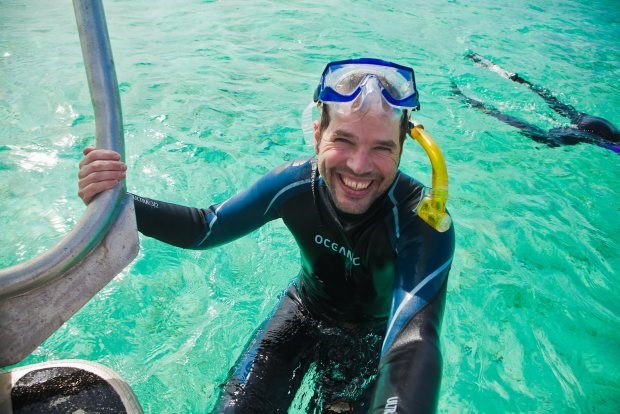When Victoria filmmaker Ian Hinkle finishes shooting undersea footage of a scuba-diving marathon in southern California's Pacific waters that once teemed with blue sharks, it's safe to say his film won't be mistaken for Shark Night 3D.
Sure, there will be sharks and other ocean predators - and 3D cameras. They're part of an arsenal of equipment to be operated by Hinkle, media director for the Canadian social enterprise Global Reef, and his team of land and underwater photographers from near and far - uniting this weekend for a fascinating expedition and his documentary chronicling it.
But 30-Mile-Dive isn't Hollywood escapism. The film's "star" - Scott Cassell, veteran deep-sea explorer and U.S. counter-terrorism operative - will attempt a non-stop scuba dive at more than six metres deep for 50 kilometres, from Catalina Island's Avalon Harbor to Los Angeles, using state-of-the-art equipment to perform scientific experiments and convey a sobering message.
(You can track the dive's progress undersea starting Saturday at globalreef.com.)
The goal is to draw attention to an ocean crisis that, being underwater, is conveniently out of sight, yet frighteningly real.
"That's why I joined the expedition as a filmmaker," explained Hinkle, who hails from Washington state, has a BA in film from UBC and has two decades of production experience in capacities from cinematographer to producer. Specializing in socio-political and environmental issues, he has long been attracted to adventure stories. Since making his directorial debut on The Living Coast for Discovery Channel, he has worked on several documentaries with climbers and solosailors.
But 30-Mile-Dive is about more than just a good athlete and a potentially world-record dive, Hinkle, 40, says. "He's not staying underwater for 15 hours for selfish reasons. He's an endurance athlete doing something for a greater good."
Cassell, who has logged more than 13,000 hours as an underwater explorer, combat and commercial diver, is also a U.S. Navy diving supervisor and medical technician, and holds the world record for longest non-stop dive distance - 84 km.
He says he fell in love with the ocean as a boy, and found his value in life from then on.
"If we were to see the devastation that has occurred in the ocean - as if it were on land - we would be horrified," said Cassell, who is distressed by such horrors as endangered tuna populations and millions of sharks routinely killed for fins each year. "When I see people harming it, I take that personally."
Cassell, who has been researching human endurance in salt water cooler than 20 C, said his original intention was to dive for 24 hours. He's since decided it would be safer to aim for a maximum of 20.
Hinkle will be on one of the larger expedition vessels co-ordinating the shoot as Cassell and rescue and support divers head to sea for the expedition, undertaken through the Undersea Voyager Project - a non-profit ocean exploration organization.
The ocean conservation project is co-sponsored by Luminox Swiss dive watches, Bloosee.com, Bad-Elf.com, Underwater Kinetics, Ocean Defenders Alliance and Ocean Management Research Network. The film and expedition are also being funded by grassroots donations through the crowd-sourcing site indiegogo.com.
Hinkle said it's an enormous challenge technologically. "We'll have 14 cameras and [will be] managing data while we shoot, editing some of the footage live on the boat and uploading it Saturday to Global Reef, Luminox and Facebook."
The dive is scheduled to start at 4 a.m. Saturday on Catalina Island, with Cassell hopefully reaching L.A. by 7 p.m.
"Scott's going to be working a lot harder than we are, but we're going to have to stay awake," said Hinkle, laughing.
He says the story driving his film will be about a man who has led a life of military service, comes home and then wonders what he'll do from then on, ultimately choosing to raise awareness of the alarming changes he's seen in the ocean over the years.
"That's the canary in the coal mine," Hinkle said.
"The blue sharks are gone - symbols of vast changes in the oceans. And it's being replicated all over the world. All of a sudden, in our generation, they're gone and we better take notice.
The sharks are one of the things everyone's noticing, and pollution and 'ocean acidification' is another.
"We want to help get that word out and look at people like Scott and what's going on in our own backyards, and be inspired." mreid@timescolonist.com
LINKS
Official website for Canadian social enterprise Global Reef: Globalreef.org Official website for Undersea Voyager Project: Underseavoyagerproject.org Luminox 30-Mile-Dive minisite: www.luminox.com/diving-worldrecord/
Trailer for 30-Mile-Dive: http://vimeo.com/26593703



